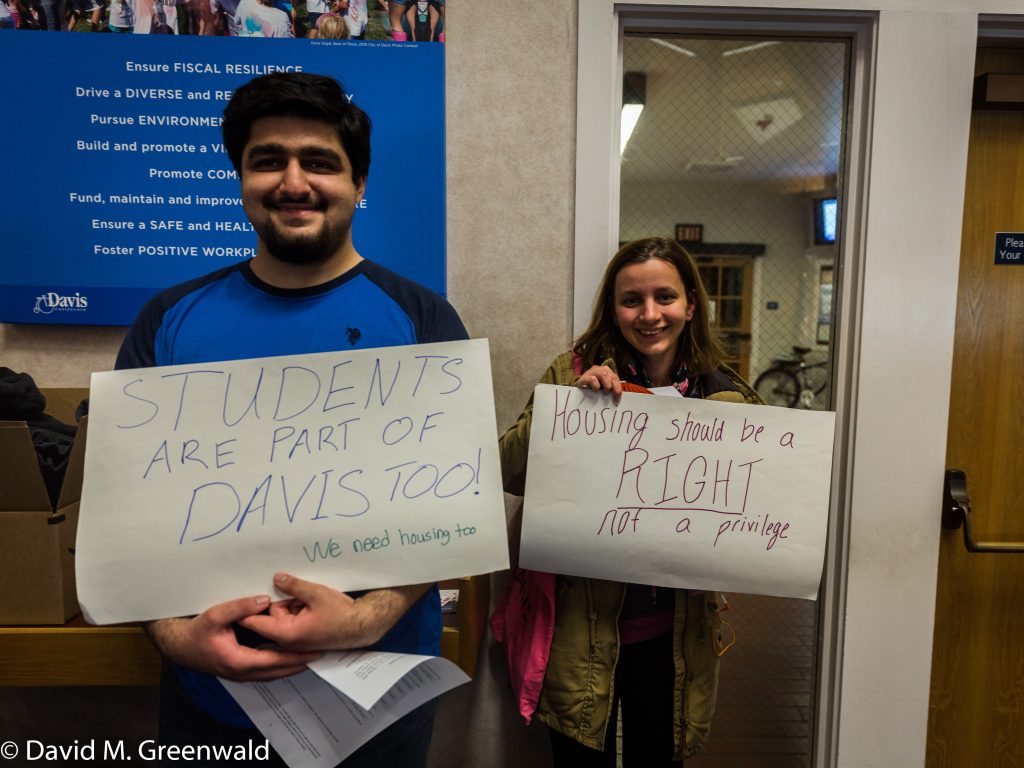
Lawyers for both sides were in court and ready to go forward with arguments in the case of Ranier v. City of Davis, which challenges the environmental review and approval of the Lincoln40 project by the Davis City Council last March.
But Judge Stephen Mock, the retired Yolo County judge, was not ready to proceed. So the matter was put off until February 8 where Judge Mock assured the parties, the matter would go forward unless settled.
At the time of approval, council voted 5-0 to pass Lincoln40, a 130-unit student-oriented apartment building on 5.92 acres, located along Olive Drive and Hickory Lane just south of the Union Pacific Railroad Tracks and the Davis Amtrak station. The project will contain 708 beds, a bike barn, parking areas, swimming pool, and various amenities. The building includes 473 bedrooms, of which 235 would be designed as double-occupancy rooms.
It contains a mix of two- to five-bedroom fully furnished units, ranging from approximately 1024 to 1797 square feet in size.
At the public hearing last March, only a handful of people opposed the project, but a month later, Susan Rainier, a local architect filed a suit represented by the Soluri Meserve Law Corporation challenging the CEQA process.
“In certifying an Environmental Impact Report for the Project, Respondent prejudicially abused its discretion and failed to proceed in the manner required by law,” attorney Patrick Soluri of the Soluri Meserve Law Corporation writes in the latest petition to invalidate a City of Davis EIR certification, this time on Lincoln40.
They add that the city has “also prejudicially abused its discretion by approving the General Plan amendment, Specific Plan amendment, and other Entitlements because the Project is inconsistent with the Gateway / Olive Drive Specific Plan and City of Davis General Plan.”
This petition argues that the city “acted arbitrarily and capriciously when certifying the EIR and approving the Project Entitlements.” They argue further that Ms. Rainier has “been harmed” by the city’s “failure to provide environmental documents that accurately and fully inform interested persons of the Project’s true impacts.”

At the March 13, 2018 meeting, then Davis Mayor Robb Davis noted that the city wasn’t even required to submit an EIR for the Lincoln40 project, because as a Transit Priority Project it was exempt from the need to do an EIR. The city, however, in an abundance of caution, went the extra mile to do an EIR on the project, hoping to avoid litigation.
However, the attorneys note, “In an apparent attempt to create a litigation fallback position if a court finds defects in the Project’s EIR, Respondent found that the Project was exempt from CEQA under Public Resources Code section 21155.1, which sets forth an exemption for ‘sustainable communities projects.’”
They argue that, in order to qualify for the sustainable communities projects exemption, “a project must among other things comply with certain environmental criteria.”
In their response brief, the Thomas Law Group representing the real party in interest, Highbridge Properties and Best Best and Krieger representing the City of Davis responded by pointing out, today, there is “a scarcity of adequate low cost housing in virtually every urban setting [in California].” Yet today, “[m]edian monthly rents in the state are now approximately 50 percent higher than the national average, but high prices have failed to spur sufficient housing construction to meet demand.”
The litigation they argue is preventing the construction of student-oriented housing in a community with a vacancy rate of approximately two-tenths of one percent, “located on an infill site within walking distance of University of California, Davis (UCD), Downtown Davis, and numerous high quality transit resources; it is precisely the type of project envisioned by Senate Bill (SB) 375, California’s premiere statute relating to land use and the state’s greenhouse gas reduction goals.”
They point out that in “evaluating the Project, the City undertook over two years of careful review, including ten public hearings,” and the project “garnered overwhelming support from UCD students, young professionals, surrounding neighbors and apartment owners, and regional agencies such as the Sacramento Area Council of Governments (SACOG).”
The response points out the city relied on two independent approaches in compliance with CEQA – first the certification of a 2000 page EIR and the separate determination that “the Project is a Sustainable Communities Project that is statutorily exempt from CEQA review in furtherance of the goals of SB 375.”
Nevertheless, they point out, Ms. Rainier “filed this lawsuit on April 12, 2018, challenging the City’s CEQA compliance.”
The city points out – as we had in previous article- “Because few environmental comments were raised during the administrative process, Rainier’s Opening Brief relies almost entirely on new issues that were not administratively exhausted. On this basis alone, Rainier’s Amended Petition should be denied.”
The respondents note, “Rainier largely fails to explain how she satisfied CEQA’s exhaustion requirement as to any of the issues advanced in her Opening Brief.”
The city a 2009 decision that points out: “Exhaustion of administrative remedies is a jurisdictional prerequisite to maintenance of a CEQA action.” And further that “no action or proceeding may ‘be brought… unless the alleged grounds for noncompliance… were presented to the public agency orally or in writing by any person during the public comment period….”
In addition the city does not belief that the lawsuit will survive on the merits either – indeed they argue that it is “meritless” with substantial evidence to support “the EIR’s conclusions” arguing, “none of Rainier’s claims have merit.”
During a time of housing crisis and student housing shortfalls, a judge strike down a housing development based on CEQA claims not raised during the approval process? That is a big question that looms as Judge Mock hears the case in February.
—David M. Greenwald reporting







How?
Davis NIMBY’s… while they sleep in their warm beds at night, hundreds if not thousands of students are sleeping in their cars, huddled trying to keep warm.
It will be interesting to see how some of the new laws interact with some of these lawsuits. None of them have been successful anyway. What they are doing is delaying our ability to get housing.